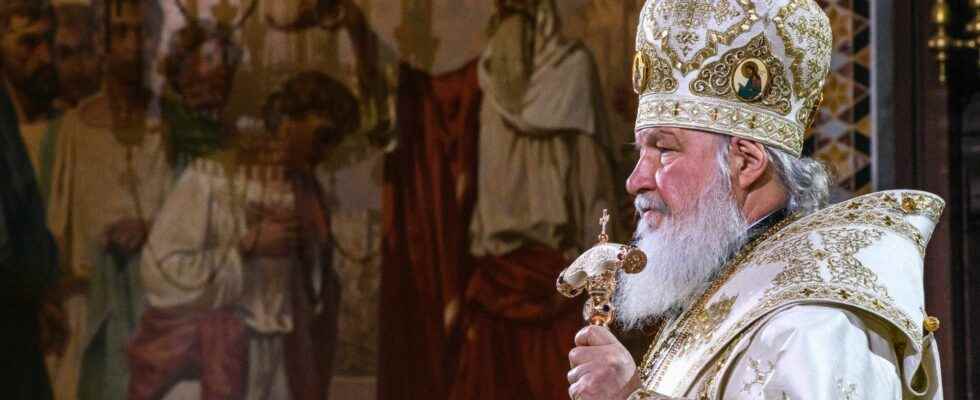The call launched by the Russian Orthodox Patriarch Kirill to silence the guns did not last very long… Only two hours after the start of the ceasefire decreed by President Vladimir Putin, the Russian army struck, this Friday, January 6, twice the city of Kramatorsk, in eastern Ukraine. A few hours earlier, Vladimir Putin said he wanted to give the possibility to the Orthodox, the majority confession in Ukraine as in Russia, to “attend services on Christmas Eve, as well as on the day of the Nativity of Christ”.
Through this, the president, as well as the highest religious authority, wanted to give pledges to their faithful and supporters, while Russia is mired in a conflict where failures are multiplying. Professor at the University of Lorraine and specialist in the cultural and religious history of Russia, Antoine Nivière sees in this desire a way for the patriarch to “restore his image” in Ukraine, but also internationally, after be positioned clearly in favor of the Kremlin. If in theory, kyiv moved away from the religious tutelage of Moscow by founding in particular an independent Church, the reality on the ground is much more complex. Explanations.
L’Express: How do you interpret this truce requested by Kirill and taken over by Vladimir Putin?
Antoine Niviere: Patriarch Kirill launched this proposal to improve his image, restore his image, vis-à-vis the Orthodox of Ukraine who consider that the patriarch is completely on the same wavelength as the Kremlin. Since the beginning of the Russian invasion, he has multiplied the sermons which justified the war and which made soldiers who died in combat heroes to whom he promised paradise. These declarations were very badly interpreted in Ukraine because Kirill thus gave arguments to President Zelensky to accuse the Orthodox Church of Ukraine, attached to the Moscow Patriarchate then declared independent last May, of complacency with Putin.
Do you also see it as a sign sent to the international community?
The Primate of the Russian Orthodox Church wants to restore a presentable image on the international scene, both vis-à-vis other Christian communities, particularly Catholics and Protestants, but also public opinion in general, as well as major international institutions. I recall that the British government, like the Canadian government, put the patriarch on the list of people sanctioned, like the leaders of the Kremlin and the Russian oligarchs who support them. Twice, the European Union had also put his name on this list, but each time it had to withdraw it at the last minute after a veto from the Hungarian Prime Minister, Viktor Orban. The patriarch therefore has a very tarnished image. It’s a way for him to position himself as a man of peace, rather than going to war.
Was Kirill’s request for a ceasefire guided by Moscow?
It is a possibility. Because the Russian army is currently in a very delicate situation and that gives it two days of respite. I will also recall that, in the liturgical calendar of the Orthodox, Christmas is not the most important feast. It’s Easter. However, last April, the patriarch did not ask for a truce, when it had been demanded by Antonio Guterres, the UN secretary general. But Putin refused it at the time. At that time, the Russian armies were on the offensive, they were winning on the ground. This time, this announcement takes place when the Russian forces are in a weak position.
Kirill intervenes as a spokesperson for the Kremlin. Sociologically, the majority of the faithful of the Russian Church are voters of Putin. Among them are many old people who are nostalgic for the past of the Soviet era, even of the tsarist past. Today, Putin has entered into a confrontation with the West, and it turns out that one of the strong elements that sets Russia apart from the West is the religious factor, so he plays on that.
Recently, the Ukrainian state security services carried out a series of searches in bishoprics and monasteries that were under the Moscow Patriarchate, claiming to have to take “counterintelligence” measures. Even if the Ukrainian Church, dependent on the Moscow Patriarchate, severed ties with Russia last May, several of its dignitaries have been sanctioned by the kyiv government for their positions deemed pro-Russian. Is she really independent?
The Ukrainian authorities believe that this is a fictitious independence and insist on the fact that this Church is still linked to Moscow. Because, indeed, this proclamation of independence did not result in an official text or significant gestures which would go in this direction. The Ukrainian authorities therefore put pressure on this Church and demand proof of the reality of independence. During the searches, they say they found a certain number of elements or documents which would rather go in the opposite direction, which would demonstrate the persistence of links between the Moscow Patriarchate and part of the hierarchy of this newly independent Church. What the latter rejects. It is a complex geopolitical standoff that is being played out, both at the canonical (religious) and legal (political) level.
The fact remains that this Ukrainian Orthodox Church, which claims to have broken its ties of subordination vis-à-vis Moscow, is now itself divided. On the territory controlled by the Ukrainian government, and where the seat and primacy of this Church are located, the discourse remains very firm in favor of the defense of the sovereignty and freedom of Ukraine. Support for Ukrainian fighters and war-stricken populations is shown. But on the other side of the front line, in the part of Donbass occupied by the Russian army and annexed, there are several dioceses where the bishops are openly pro-Russian. The Ukrainian Orthodox Church cultivates this ambiguity.
